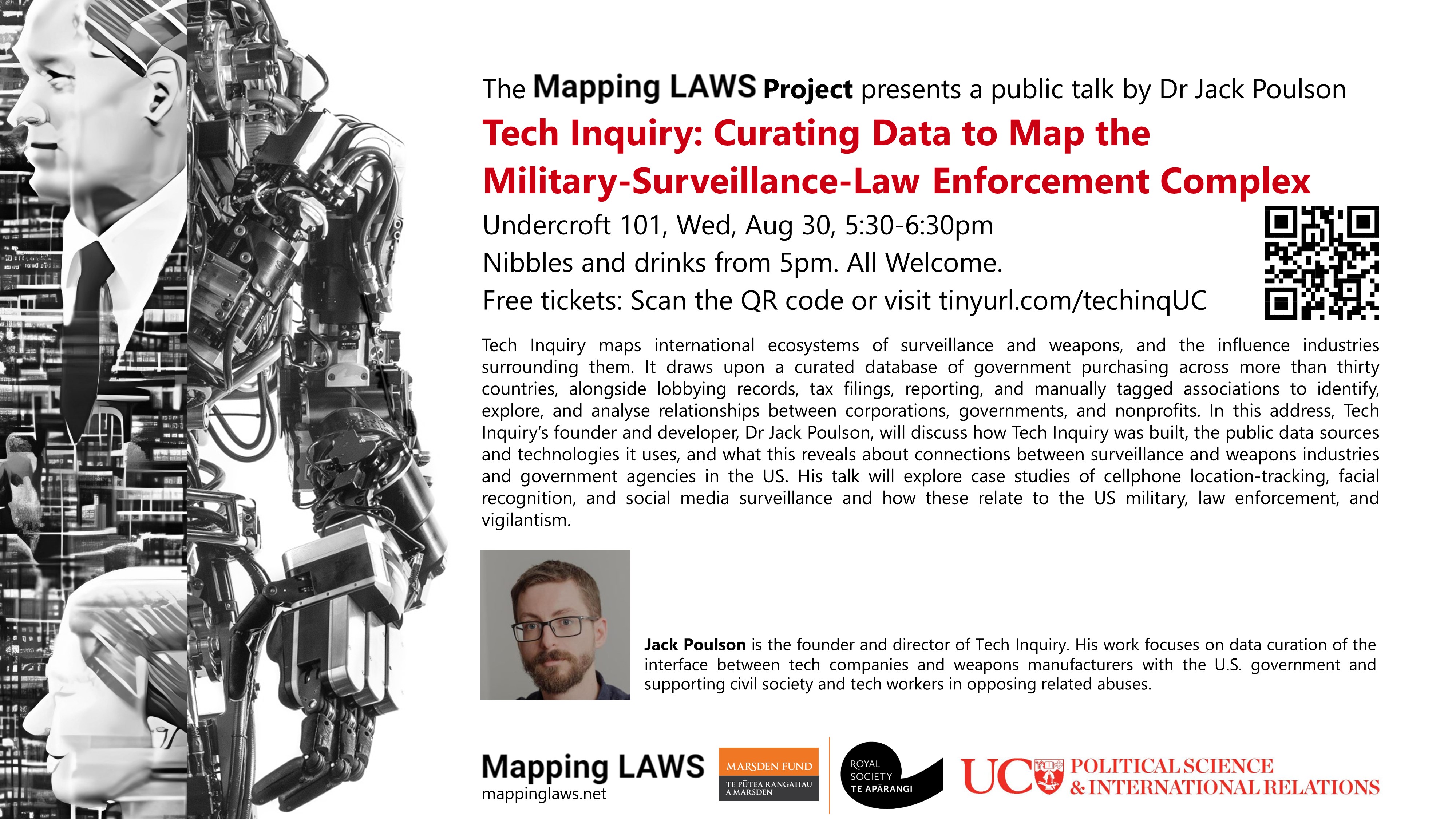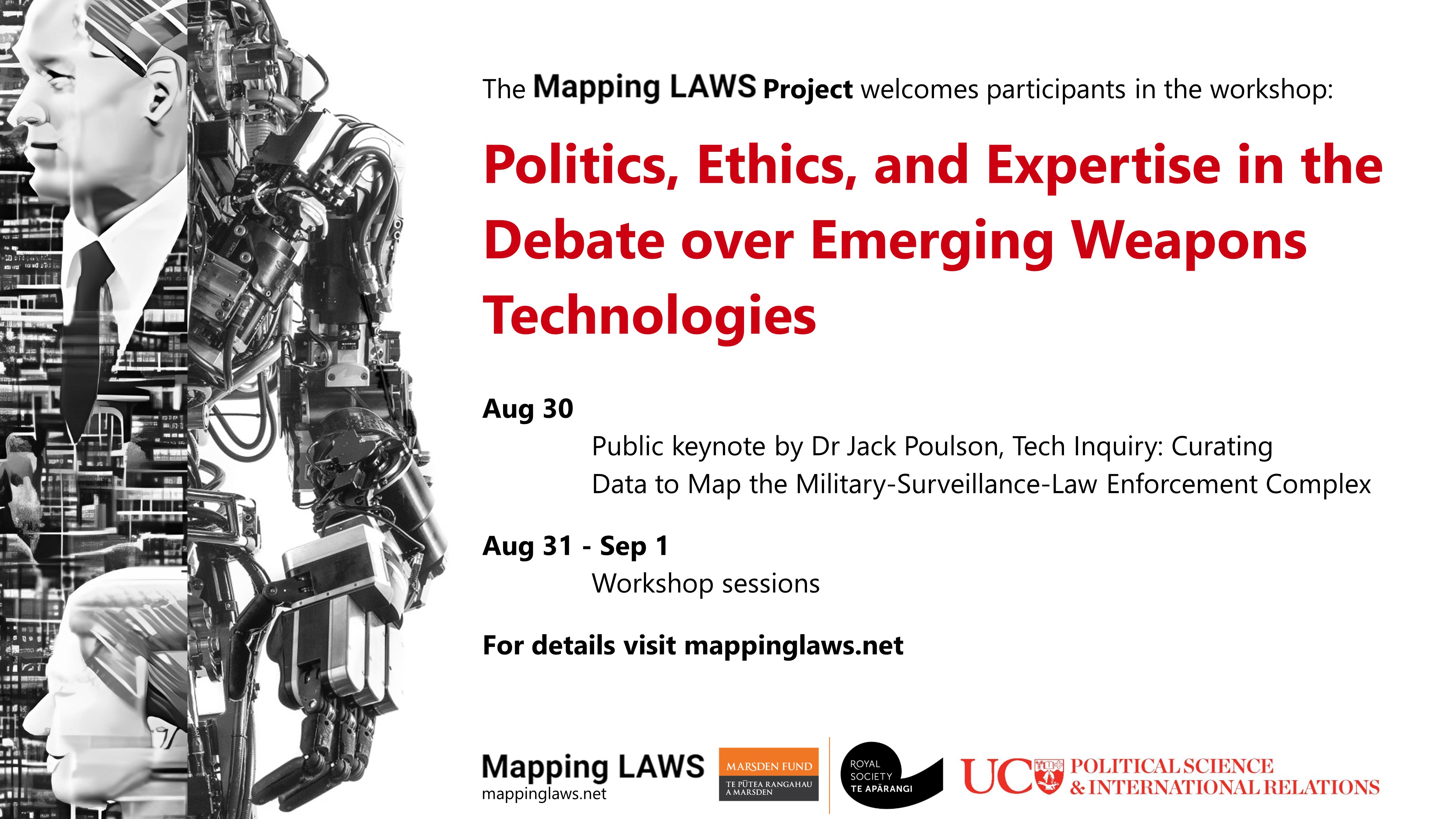Mapping LAWS Workshop: Politics, Ethics, and Expertise in the Debate over Emerging Weapons Technologies
University of Canterbury, Christchurch, New Zealand
August 30 – September 1, 2023
As concerns over the possible military applications of artificial intelligence have grown over the past decade, so too has the number of forums in which these developments are being debated. Governments, militaries, activist groups, lobbyists, and academics have all sought to have their voices heard on the prospects and dangers of developing and deploying lethal autonomous weapons systems (LAWS). Claims to different kinds of expertise have been central to this process, with military figures, think tankers, roboticists, computer scientists, legal scholars, ethicists and other academics all seeking to offer special knowledge that can guide this future-focused debate. At the centre of this, the possible regulation or banning of LAWS takes place within the Convention on Conventional Weapons (CCW) under the banner of a Group of Governmental Experts (GGE). In short, contestation over the legality and ethics of emerging weapons technologies is dominated by a wide range of actors claiming different forms of expertise to underpin their political positions.
This workshop aims to delve into the politics of expertise in the debate over emerging weapons technologies, particularly LAWS. Questions to be considered may include: How have states or groups that support or oppose the development of LAWS sought to draw upon experts and expertise in making their cases? What qualifies someone as an expert on LAWS and how is the status of expertise affirmed in public settings? In what ways are experts in the LAWS debate connected to states and industrial players that have interests in the outcomes? How do public perceptions of expertise shape the debate and limit the possibility of more radical or critical interventions? What forms of knowledge or expertise have been marginalised or excluded from the debate?
The workshop will run over two days from August 31 - September 1, with presentations grouped thematically across a number of sessions. We aim to produce either a journal special issue or edited collection in the months following the workshop. Dr Jack Poulson of Tech Inquiry is the keynote speaker, and the keynote address will be delivered as a public talk on August 30 (more details below).

Keynote Speaker

We are delighted to announce that Jack Poulson, Executive Director of tech accountability nonprofit Tech Inquiry, will be joining the workshop and delivering a keynote address. The keynote is open to the public and free tickets are available via Humanitix.
Dr Poulson completed his PhD in Computational and Applied Mathematics at UT Austin in 2012 before serving as an Assistant Professor of Computational Science and Engineering at Georgia Tech then as an Assistant Professor of Mathematics as Stanford University. After two years as a Research Scientist in Google’s AI division working on recommendation systems and natural language processing, he resigned in protest of the company rolling back its international human rights protections and transitioned (back) into the nonprofit sector. His work focuses on data curation of the interface between tech companies and weapons manufacturers with the U.S. government and supporting civil society and tech workers in opposing related abuses.
Keynote Abstract
Tech Inquiry maps international ecosystems of surveillance and weapons, and the influence industries surrounding them. It draws upon a curated database of government purchasing across more than thirty countries, alongside lobbying records, tax filings, reporting, and manually tagged associations to identify, explore, and analyse relationships between corporations, governments, and nonprofits. In this address, Tech Inquiry’s founder and developer, Dr Jack Poulson, will discuss how Tech Inquiry was built, the public data sources and technologies it uses, and what this reveals about connections between surveillance and weapons industries and government agencies in the US. His talk will explore case studies of cellphone location-tracking, facial recognition, and social media surveillance and how these relate to the US military, law enforcement, and vigilantism.

Workshop Participants
- Jack Poulson, Tech Inquiry
- Lucy Suchman, Professor Emerita of Anthropology of Science and Technology, Department of Sociology at Lancaster University
- Jeremy Moses, Associate Professor of International Relations, University of Canterbury
- Geoff Ford, Lecturer, University of Canterbury
- Sian Troath, Postdoctoral Fellow in International Relations, University of Canterbury
- Michael Richardson, Associate Professor of Media, UNSW Sydney
- Daniel Chia Matallana, PhD Candidate, Victoria University of Wellington
- Ingvilde Bode, Associate Professor of International Relations, University of Southern Denmark
- Anna Nadibaidze, PhD Fellow, University of Southern Denmark
- Natasha Karner, PhD Candidate, RMIT University
- Berenike Prem, Postdoctoral Researcher, University of Bremen
- Fynn Horstmannshoff, Graduate Student, University of Bremen
- Bianca Baggiarini, Lecturer in Military Studies, Australian National University
- Sean Rupka, PhD Candidate, UNSW Canberra
